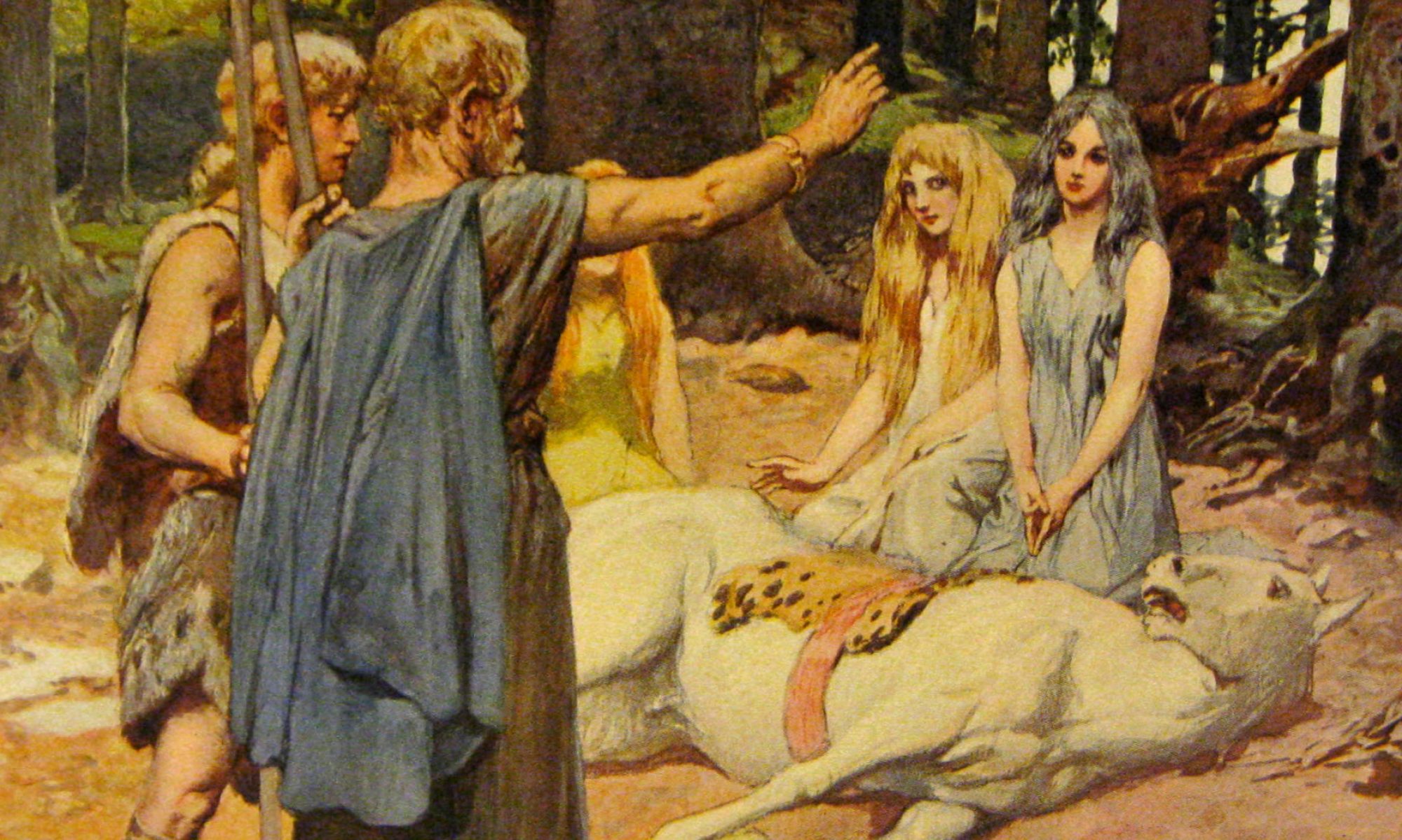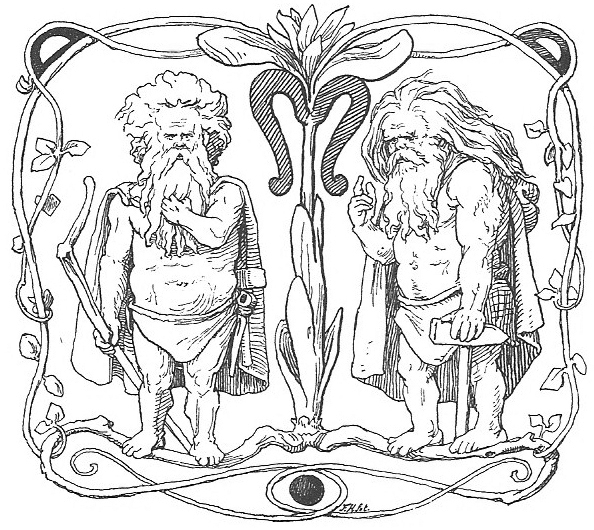13.
Fíli, Kíli, / Fundinn, Náli,
Fili, Kili, / Fundinn, Nali,
- Fili =Fílli Old Saxon or Old High German fīla (“file”), thus meaning “The Filer” (1) File. (2) By association with weak masculine nouns formed on tool-names it may mean ‘filer,’ as Gering (13) thinks. Cp. MnN S D fil. The source is Frisian or LG file, which, coming in with commerce, displaced the native fœl of the Scandinavian main-land, but failed in Iceland to drive out þel.
- Kili =Kíli Wedge. Possibly, one who uses a wedge. Cp. MnN, D kile, S dial. kila, borrowed from Frisian or LG kil. This foreign word was victorious on the Scandinavian mainland, but not in Iceland where veggr is retained.
- Fundinn Found. Cp. fundinn, pp. of finda, ‘to find.’ verb perf act finna to find (þá fundu þeir Hjörleif dauðan) ;
- Nali =Nári Axle of a hand-mill. Cp. nál, (1) ‘needle, tree-nail,’ (2) = mǫndull,’axle of a hand-mill.’ / nál f (genitive singular nálar, nominative plural nálar) needle
Hepti, Víli, / Hanarr, Svíurr,
Hepti, Vili, / Hanarr, Svíurr,
- Hepti wiktionary
- Hepti verb hepta to bind, fetter; h hross, hest, to hobble a horse ; noun hepti haft (of a dirk)
- Vili =Víli Of uncertain origin and meaning, but possibly a misspelling for Fíli, meaning “The Needle”
- Vili noun sg nom vili will, wish, desire (sigrsæll er góðr v) ;
- Hanarr Hanarr m (genitive Hanars) Possibly from Old Norse hannarr (“skilled”), thus meaning “Skilled One”
- Svíurr Svíurr m (genitive Svíurs) Possibly related to Old Norse svína (“to dwindle, subside”), thus meaning “Dwindled One” Cp. possibly MnI svía, ‘to decrease,’ used of pain. svíun, ‘decrease of pain,’ MHG svinen, ‘to disappear.’
Billingr, Brúni, / Bíldr ok Buri,
Billingr, Brúni, / Bildr and Buri,
- Billingr billingr (“twin brother”), thus meaning “Twin Brother” Cp. MnN billing, idem., Finnish Swedish, bil, ‘uncle.’
- Brúni Old Norse brúnn (“brown”), thus meaning “Brown One” Black or dark brown. Cp. brunn,idem.
- Bildr An edged weapon or instrument. Cp. bildr, ‘instrument for bloodletting, axe,’ MnI bildur, ‘instrument for bloodletting, arrow or other projectile,’ MnN bill, ‘instrument for bloodletting,’ S dial. bill, ‘tool for cutting ice,’ OS bilder,MnS plogbill, ‘plow-share,’ E bill, ‘a weapon.’ bíldr an instrument for letting blood, lancet (örit var sem bílds spor yæri, a scar as from a b)
- Buri Son. Cp. burr,’son.’ probably meaning “Bringer Forth”. Compare Borr (“One Brought Forth”).
Frár, Hornbori, / Frægr ok Lóni,
Frár, Hornbori, / Fregr and Lóni,
- Frár frár (“swift”), thus meaning “Swift One”
- Hornbori horn (“horn”) + bora (“to bore, drill”), thus meaning “Horn-borer”. Hornborer, i.e. a man who bores horn. Cp. horn, ‘horn’, bora, ‘to bore,’ MnI, MnN, S dial., D, OE, MLG bor, S borr,’auger, gimlet, drill.’
- Frægr frægr (“famous”), thus meaning “Famous One”
- Lóni lón (“a still place in the flow”), thus meaning “Lazy One”, “Still One”. lón n (genitive singular lóns, nominative plural lón) a lagoon
Aurvangr, Jari, / Eikinskjaldi.
Aurvangr, Jari, / Eikinskjaldi.
- Aurvangr aurr (“clay, mud”) + vangr (“wong, field”), thus meaning “Mud-wong” / aurr m (genitive aurs, plural aurar) moist earth, wet clay, mud / vangr m (genitive vangs, plural vangar) (poetic, especially in compounds) a garden, field, meadow / Gravelly plain. Cp. aur, ‘gravel,’ vangr, ‘plain.’
- Jari jara (“battle”), thus meaning “Warrior”Warrior. Cp. jara, ‘battle.’ If this name was constructed from Jǫruvellir, the man who did it probably thought Jǫruvellir meant ‘battle-plains.’
- Eikinskjaldi eikinn (“oaken”) + skjǫldr (“shield”), thus meaning “One with Oaken Shield”/ The one with the oaken shield. Cp. eik, ‘oak, skjǫldr, ‘shield.’ FJ and Gering (17) prefer this definition. Ross and Bugge prefer ‘the one raging with a shield.’ Cp. eikinn, ‘violent, raging.’ But warriors do not ordinarily ‘rage’ with a weapon of defence.


